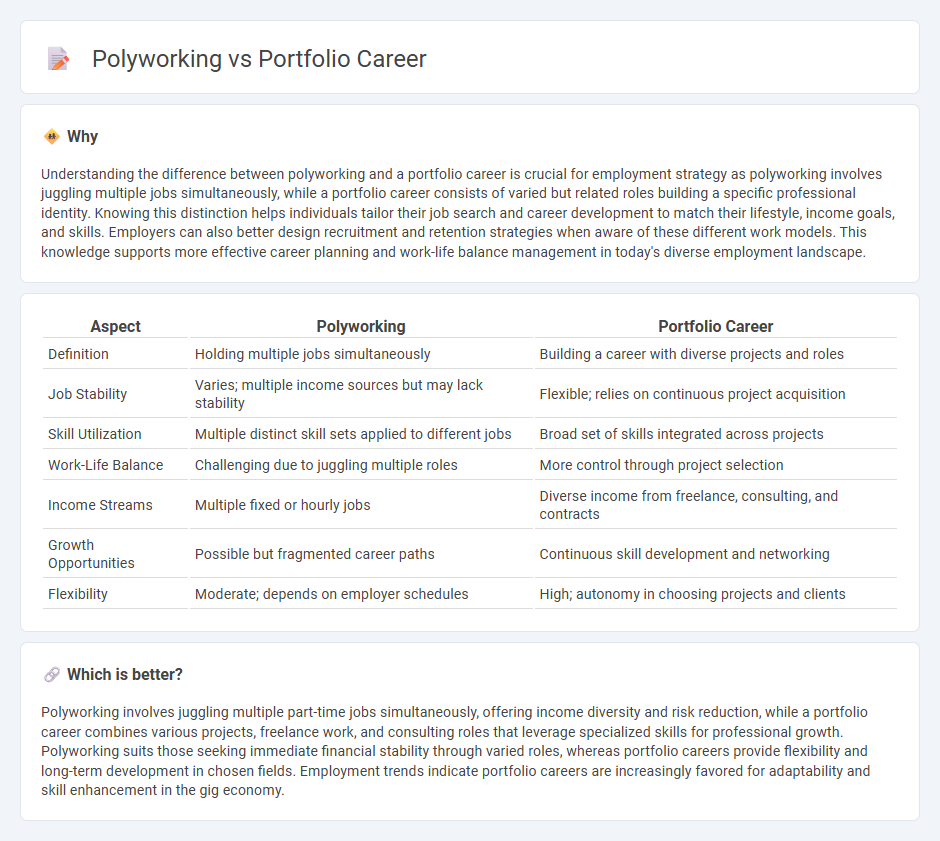
Polyworking involves juggling multiple part-time jobs or projects simultaneously, offering diverse income streams and skill development, while a portfolio career combines various freelance roles and entrepreneurial ventures tailored to personal interests and market demands. Both approaches provide flexibility and autonomy, aligning with evolving employment trends favoring adaptability over traditional single-job pathways. Explore the advantages and challenges of polyworking and portfolio careers to determine which model suits your professional goals best.
Why it is important
Understanding the difference between polyworking and a portfolio career is crucial for employment strategy as polyworking involves juggling multiple jobs simultaneously, while a portfolio career consists of varied but related roles building a specific professional identity. Knowing this distinction helps individuals tailor their job search and career development to match their lifestyle, income goals, and skills. Employers can also better design recruitment and retention strategies when aware of these different work models. This knowledge supports more effective career planning and work-life balance management in today's diverse employment landscape.
Comparison Table
| Aspect | Polyworking | Portfolio Career |
|---|---|---|
| Definition | Holding multiple jobs simultaneously | Building a career with diverse projects and roles |
| Job Stability | Varies; multiple income sources but may lack stability | Flexible; relies on continuous project acquisition |
| Skill Utilization | Multiple distinct skill sets applied to different jobs | Broad set of skills integrated across projects |
| Work-Life Balance | Challenging due to juggling multiple roles | More control through project selection |
| Income Streams | Multiple fixed or hourly jobs | Diverse income from freelance, consulting, and contracts |
| Growth Opportunities | Possible but fragmented career paths | Continuous skill development and networking |
| Flexibility | Moderate; depends on employer schedules | High; autonomy in choosing projects and clients |
Which is better?
Polyworking involves juggling multiple part-time jobs simultaneously, offering income diversity and risk reduction, while a portfolio career combines various projects, freelance work, and consulting roles that leverage specialized skills for professional growth. Polyworking suits those seeking immediate financial stability through varied roles, whereas portfolio careers provide flexibility and long-term development in chosen fields. Employment trends indicate portfolio careers are increasingly favored for adaptability and skill enhancement in the gig economy.
Connection
Polyworking involves simultaneously managing multiple jobs or roles, while a portfolio career refers to building a diverse collection of skills and experiences across various professions. Both concepts emphasize flexibility, adaptability, and the pursuit of varied income sources to enhance job security and personal fulfillment. This interconnected approach allows individuals to leverage multiple opportunities, reducing dependency on a single employer and fostering continuous professional growth.
Key Terms
Multiple income streams
A portfolio career involves cultivating diverse roles typically aligned with an individual's professional expertise, generating multiple income streams through various part-time or freelance positions. Polyworking extends beyond career-related tasks, incorporating both paid and unpaid projects across different industries or passions to diversify earnings. Explore deeper insights on maximizing financial resilience through strategic multiple income streams.
Skill diversification
Portfolio careers emphasize building a diverse range of skills across multiple professions, allowing individuals to adapt to various market demands and increase employment resilience. Polyworking entails simultaneously engaging in several professional roles, expanding expertise and fostering innovation through practical application in real-time environments. Explore in depth how skill diversification in portfolio careers and polyworking can shape career growth and flexibility.
Flexibility
Portfolio careers emphasize flexibility by allowing professionals to manage multiple part-time roles or projects simultaneously, fostering diverse income streams and skill development. Polyworking also promotes flexibility but involves juggling various jobs or roles that may not be related, encouraging adaptability and broad experience across industries. Explore detailed strategies to maximize flexibility within portfolio careers and polyworking models.
Source and External Links
Portfolio career - Wikipedia - A portfolio career involves having multiple roles, often combining paid and voluntary work, providing flexibility, variety, multiple income streams, and resilience against job insecurity, popularized by Charles Handy in the 1990s.
What Is A Portfolio Career? - A portfolio career means monetizing diverse skills across different roles, potentially earning significantly more than traditional full-time jobs, especially when specializing in high-demand niches.
WTF is a portfolio career? - by Anna Mackenzie - A portfolio career consists of multiple part-time jobs or income streams simultaneously, embracing evolving interests and combining jobs, services, creative work, and volunteering for a flexible and diverse professional life.
 dowidth.com
dowidth.com